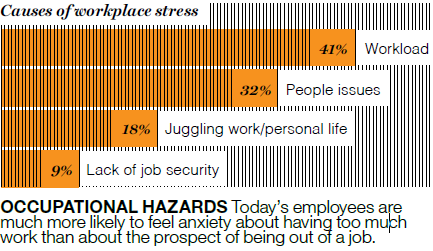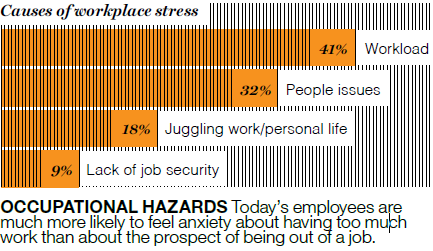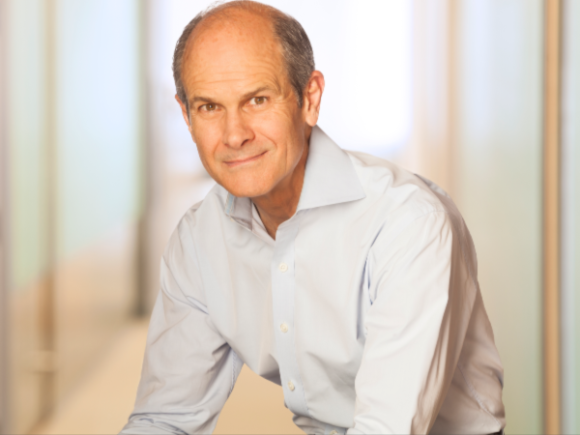Aug 6, 2014
The New Trend? Reducing Stress in the Workplace— by Order of Management Insights

“Wellness is the new green”, says Kirsten Ritchie, and as director of sustainable design at the big Gensler architecture and design firm, she would know. I had asked her about important trends in workplaces. For years employers and employees have been insisting on eco-friendly buildings, and they still do—it’s just
that now that’s all taken for granted. People assume their building is good for the environment; now they want a building that’s good for them. And that shift is part of a larger trend.
The wellness-at-work movement is accelerating in the U.S. at a time when employers generally are desperate to cut costs, and you have to wonder why. Employers on average will spend 15% more per employee on wellness programs this year than last, says a recent survey. More companies are offering free massages, gym memberships, nutrition counseling, meditation courses, and cash incentives to exercise. In addition, when they renovate an office building, the changes can be radical, says Ritchie—lots more natural light, high-rate air exchange, generous communal spaces.
Again, why all this now? Here’s what seems to be happening. As work becomes increasingly cognitive, fast-changing, and uncertain, we’re wearing people out in new ways. These are unforeseen effects of the friction-free economy.Back in the 1960s economists predicted that today’s typical worker would be so astoundingly productive that he’d have a low-worry occupation and get to spend 13 weeks a year on vacation. Instead, if you’re like most Americans, you’re not even taking all the vacation leave you’ve been granted.
The government workweek statistics mean less every year. They’re from the era when work was more sharply defined and the job stressors were largely physical. Today Cleveland Clinic offers wellness programs to employers and finds that physical issues—tobacco use, inactivity, poor nutrition—aren’t the biggest problem. Rather, “stress support is our clients’ No. 1 request,” says Joe Sweet, an executive at Cleveland Clinic Wellness. “The workforce is experiencing increased stress, anxiety, and depression at all levels. Nobody is immune to the rapid technology advances, and all feel the pressure to stay ahead of them or lose.”
A couple of high-profile suicides last year—of Zurich Insurance’s CFO and Swisscom’s CEO—raised the issue’s visibility, especially because of hints that high stress played a role in both cases. The two incidents are more emotionally than statistically significant. But Wall Street firms have responded with a spate of new policies, for example, urging employees to take all their vacation and forbidding them to come to the office on Saturdays; “exceptions should be rare and defensible,” says Citigroup’s policy, and if you really want to come in on Saturday, you need a manager’s approval.
Friction made the economy less efficient, but it protected people; sometimes it was simply not possible for you to be reached or to get information or participate in a meeting. In today’s friction free economy the old protections are gone, and employers and employees are struggling more than ever to figure out the new ones. “Some organizations are ramping up the promotion of their employee-assistance programs,” reports Cleveland Clinic’s Sweet, “in an effort to extinguish the supposed stigma of meeting with a clinical counselor to discuss anxiety, burnout, or depression.”
My advice? Take all your vacation this year, though I know you probably won’t. Don’t check work email more than once a day on vacation, though I realize that’s also impossible. Sign up for the mindfulness course at work. I know you don’t have time, but remember that people who meditate have a saying that if you don’t have time for a half-hour of meditation a day, you need an hour.
We’ve been replacing the physical stressors of work with mental and emotional stressors for many years. What’s new is that we’re hitting a resistance point. Many people seem to be reaching a limit. In an increasingly friction-free economy, mental and emotional health is the new wellness.
Speaker
Tags

 Geoff Colvin
Geoff Colvin